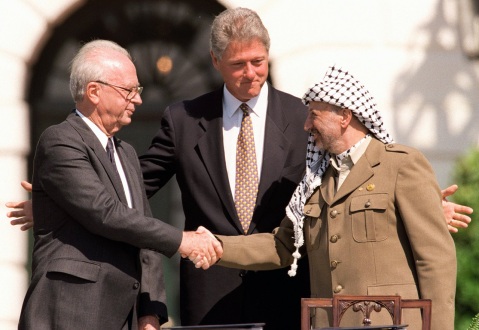Like Dreamers
On the 9th of December 1987, Palestinian riots broke out in Gaza and the West Bank, in what later became known as the first Intifada. Israel had a hard time understanding the roots of the upheaval, and therefore mishandled the escalating events. The Minister of Defense at the time was Yitzhak Rabin, a hardliner who advocated taking tough measures to suppress the riots. And so, Israel enforced huge curfews and mass arrests, destroyed and sealed houses, and even closed schools. “We will break their hands and legs” he once said. Hardly the dove he was later depicted as by his enemies.
Two days ago, the Israeli Knesset commemorated the 18th anniversary of Rabin’s murder (he was actually murdered on the 4th of November, but the Knesset set the Jewish date as the official memorial day). Listening to the speeches of the Israeli politicians – all paying lip service to their constituents, and to the Rabin family sitting in the guest seats usually occupied by retired politicians and foreign dignitaries – I was mostly struck by the superlatives thrown upon Rabin: “pragmatist”, “realist”, “logical”, “down-to-earth”, “practical”. Conspicuous by their absence, were any references to an ideology or a vision.
Israel’s short history has seen the rise and failure of two political and social movements which both outlined visions and ideals.
The socialist, Zionist and somewhat anti-religious movement identified with the Israeli left, built the original kibbutzim, laid the foundations for the reborn Jewish state, and led Israel through the first decades of its existence. The leaders of this movement became Israel’s ruling elite, and yielded unparalleled power and influence. But after the Yom Kippur war debacle in 1973, they appeared to be a spent force, exhausted spiritually, morally and politically.
The second movement is the religious-nationalist settlement enterprise. Deliberately modeled on Israel’s original settler movement, this movement was driven by a strong biblical connection and religious devotion to God and his demands, and not by the secular vision of Jews liberated from the ghettoes and freed from the fetters of capitalism. The movement coalesced around “Gush Emunim” or the “Bloc of the Faithful”, and has defined much of Israel’s political agenda for the past 40 years, just as the kibbutz movement and its leaders shaped Israel and its priorities through the early period of its existence.
Both movements failed. The kibbutzim didn’t turn Israel into a socialist paradise, and the hubris and shortsightedness of the Labor elite, which sprang from the kibbutz movement, failed Israel in the Yom Kippur war. The settlement movement succeeded in moving hundreds and thousands of Israelis into Judea and Samaria (and Gaza before the withdrawal), but after the first Intifada, the majority of Israelis realized that holding onto the West Bank without paying the price was impossible, the idea of a “Greater Israel” – a costly dream.
Just as the first Intifada dealt a blow to the settlement movement by proving that there was no such thing as a benign occupation, the second Intifada in 2000 dispelled the left-wing argument that territorial compromise with the Palestinians would be easily achieved once Israel opened itself to the possibility of peace. Yet this second uprising also convinced Israelis that Israel has no place ruling another people. What has emerged since, is a third movement that can be termed “Centrism”.
Two basic assumptions underline this movement: a) The Arab world does not, and probably will not, acknowledge Israel’s right to exist in the Middle East, and b) we cannot continue to occupy and rule the Palestinians. This centrist view lacks the magnetic power of social transformation or the messianic message embedded in the settlement movement, yet it has still managed to prevail as the predominant mood and line of thinking amongst the majority of Israelis.
Beggars can’t be choosers. If it is this emerging centrist outlook that eventually pushes us to make the brave steps towards securing the future of this country as a democratic and Jewish state, should we really complain?
More than anything, centrism, and the words uttered by the politicians in the Knesset two days ago, demonstrate that there is little place for ideologies and dreams in Israel 2013. Israel is no longer living a dream, but dealing with a difficult reality. As a country that is a political dream come true, perhaps we should be worried. Israelis have in the past lived and died for dreams. Will they be willing to do so in the future?
“When the Lord brought back those that returned to Zion, we were like unto them that dream” (Psalms 126,1).


Recent Comments